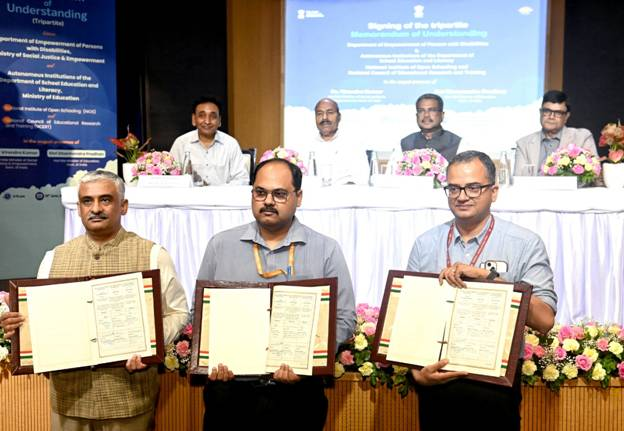Tripartite MoU Paves Way for Inclusive Education for Children with Disabilities
This tripartite partnership signals a strong convergence of social justice and educational advancement, uniting three key institutions toward a common goal—educational inclusivity.

- Country:
- India
In a landmark step toward ensuring accessible and equitable education for all, a Tripartite Memorandum of Understanding (MoU) was signed in New Delhi today between the Department of Empowerment of Persons with Disabilities (DEPwD) under the Ministry of Social Justice and Empowerment, the National Institute of Open Schooling (NIOS), and the National Council of Educational Research and Training (NCERT). The agreement aims to establish a structured framework for advancing inclusive education in alignment with the Rights of Persons with Disabilities Act, 2016 and the National Education Policy (NEP) 2020.
The signing ceremony was presided over by Union Minister for Social Justice and Empowerment, Dr. Virendra Kumar, and Union Minister for Education, Shri Dharmendra Pradhan, who together reaffirmed the government's commitment to inclusive growth, educational equity, and empowerment of persons with disabilities.
A Vision Aligned with Legal and Policy Mandates
This tripartite partnership signals a strong convergence of social justice and educational advancement, uniting three key institutions toward a common goal—educational inclusivity.
-
The collaboration is anchored in the Rights of Persons with Disabilities Act, 2016, which mandates the provision of inclusive education for children with disabilities.
-
It also aligns with the NEP 2020, which emphasizes multilingual, holistic, and inclusive education for all learners, with specific focus on disadvantaged and marginalized communities.
Dr. Virendra Kumar called the MoU “a significant milestone in building a just and inclusive society,” adding that, “Children with disabilities are full of potential, and when given the right platform, they can illuminate society with their talents.”
Key Components of the MoU
1. Establishment of Special Accredited Institutions for Education of the Disabled (SAIEDs)
NIOS will recognize and accredit special schools run by NGOs funded under the Deendayal Disabled Rehabilitation Scheme (DDRS). These schools, once designated as SAIEDs, will offer a spectrum of academic and vocational programmes:
-
Open Basic Education (OBE) at Levels A, B, and C (equivalent to classes I–VIII)
-
Secondary and Senior Secondary education
-
Vocational education pathways tailored to learners with disabilities
NIOS will manage all aspects of academic administration including:
-
Student admissions
-
Examination registration
-
Distribution of self-learning materials (SLMs)
-
Issuance of ID cards, hall tickets, and certificates
NIOS will also ensure reasonable accommodations and examination exemptions, in accordance with disability-specific needs.
2. Curriculum Reform and Pedagogical Adaptation
Under the MoU, NCERT will take charge of reviewing and adapting school curricula and textbooks in line with:
-
The principles of NEP 2020, especially flexibility and child-centric learning
-
Universal Design for Learning (UDL) to ensure content accessibility
-
Cultural and linguistic relevance for children with diverse backgrounds
The emphasis will be on inclusive instructional design, use of assistive technologies, and Indian Sign Language (ISL) as a subject, introduced by NIOS at the secondary level.
Leadership Perspectives on Inclusive Education
Shri Dharmendra Pradhan described the MoU as a strategic step toward realizing the dream of an inclusive India. He stressed the importance of social sensitivity and awareness, stating, “Empowerment of persons with disabilities is not optional; it is essential for a just society.”
He also made a strong announcement on infrastructure readiness, stating that all schools lacking accessible toilets will be equipped in mission mode within the coming year. “No child should have to leave school for lack of basic facilities,” he declared.
Administrative and Strategic Support
Shri Rajesh Aggarwal, Secretary of DEPwD, emphasized the increasing participation of children with disabilities in science education and expressed hope of seeing more such students enter elite institutions like IITs and IIMs. He commended the introduction of Indian Sign Language in mainstream curriculum as a sign of meaningful policy evolution.
Shri Sanjay Kumar, Secretary, Department of School Education and Literacy (DoSEL), reaffirmed the commitment to mainstream every child with disability, ensuring that none are left behind in formal education systems.
Formation of Joint Coordination Committee (JCC)
To ensure effective implementation, the MoU mandates the establishment of a Joint Coordination Committee (JCC) comprising representatives from DEPwD, NIOS, and NCERT. The JCC will:
-
Monitor program execution
-
Resolve inter-agency operational challenges
-
Track enrollment, retention, and completion rates
-
Guide continuous curriculum and pedagogical innovation
Empowerment Through Education: A National Imperative
This partnership is more than an administrative agreement—it is a transformational policy instrument. It brings together institutional expertise in curriculum design (NCERT), open schooling flexibility (NIOS), and disability empowerment (DEPwD). The MoU represents a shift toward systemic inclusion, not just as policy rhetoric but as a concrete, measurable goal.
It further supports:
-
Expansion of inclusive pedagogy
-
Greater awareness in society
-
Integration of assistive technologies
-
Enhanced career pathways for students with disabilities
Looking Ahead
With this tripartite MoU, India moves closer to a future where every child, regardless of physical or cognitive ability, can pursue quality education in a supportive, inclusive environment. The agreement not only strengthens institutional collaboration but also sets in motion a long-term roadmap to make inclusivity a pillar of India’s educational and social development goals.
Tags:










